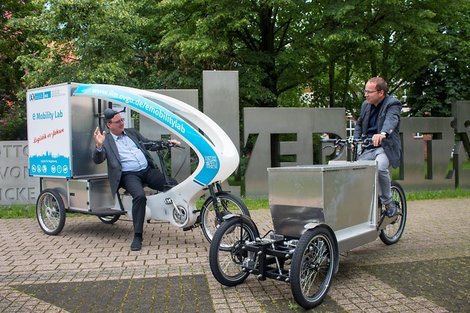Around 80 percent of Saxony-Anhalt’s population lives in rural areas. That calls for a lot of mobility. How do we reconcile this with efforts to reduce traffic volumes and harmful emissions? Researchers at Otto von Guericke University (OVGU) in Magdeburg are developing intelligent mobility concepts.

Stephan Schmidt, Professor for autonomous vehicles ©IMG Sachsen-Anhalt
The small mediaeval town of Stolberg, with its half-timbered buildings, has held Historic European Town status since 1993 and is also a spa resort. Health and tourism must go hand in hand. But traffic volumes and CO2 levels are high on the narrow streets between over 380 restored half-timbered buildings. So the town became a partner in a long-term research project: researchers at Otto von Guericke University (OVGU) in Magdeburg are developing concepts for intelligent mobility. “In Stolberg we’re testing the use of an automated shuttle bus with an electric motor. It’s designed to take visitors from the parking lots on the edge of town to the historic center,” says Project Coordinator Hartmut Zadek, Professor of Logistics at OVGU’s Faculty of Mechanical Engineering. He emphasizes the term “automated”. The ultimate objective is an autonomous shuttle with a preprogrammed route, parts of which will not require a driver. But at the current stage of development a driver is essential while the artificial intelligence in the software is learning – just like a human brain. Zadek says that by using real-life driving experience, the developers are learning too – in terms of what works or doesn’t work – with a view to the longer-term vision of driverless shuttle buses. He highlights the technical possibilities as well as user acceptance, and of course legal regulations, which are not yet in place. Engineers, computer scientists, environmental psychologists, social scientists, logisticians and network experts are all contributing their expertise. The plan is to drive an automated shuttle bus through Stolberg by the middle of next year in 2021.
Real-time communication in road traffic
The minibus is being developed by e.GO MOOVE GmbH, an electric commercial vehicle manufacturer in North Rhine-Westphalia. The particular challenge with automated driving is real-time communication between road users as well as between the vehicles and the overall transportation infrastructure, says researcher Zadek. Interactive sensor technology is used to capture traffic data, for example about tailbacks and obstacles, and relay it to vehicles. “Traffic intersections such as junctions and roundabouts, but above all traffic light installations, have to be fitted with sensors and/or transmitters in order to send ongoing traffic data to automated vehicles,” says the professor, who goes on to explain that communication tests are currently under way along a traffic-light controlled route in Halle, in collaboration with the Magdeburg Institute for Automation and Communication (ifak).
In Stolberg, there are no traffic lights. So the next step will also be to run a shuttle bus in Magdeburg, the state capital, on a suitable pilot route. “Filtering back into the flowing traffic after stopping is a particular challenge for the technical systems,” says logistics expert Zadek. He mentions the development of a digital control center to monitor all of the automated systems, which would allow an operator to intervene if necessary. This control center would then be integrated in the control room of the owner – such as a passenger transportation company.
Parcel delivery 4.0
When it comes to energy efficiency, and to minimizing traffic volumes and CO2 levels, parcel delivery services are also under the spotlight. Zadek, who is managing the project, says that since consumer behavior will not change and online shopping is on the rise, the model region for intelligent mobility would, of course, take account of the need for sustainable parcel delivery. He is referring to a future urban hub run by project partner Biberpost, which bundles deliveries from different parcel services so that they can be driven to a micro-depot in a local district. The parcels are then collected by their addressees or delivered by electric cargo bikes. Magdeburg engineering company FIApro has expertise in prototype construction. It is developing and building the swap bodies for the e-cargo bikes that are loaded at the urban hub. Test operations at the first Magdeburg micro-depot with parcel bikes are due to start in mid-2021.
A helping hand for communities
Looking further into the future, the logistics professor predicts autonomous parcel delivery vehicles in Magdeburg. Once again, Otto von Guericke University is laying the groundwork. An interdisciplinary team led by Stephan Schmidt, professor for autonomous vehicles, is developing the riderless cargo bike – from the chassis, to the intelligent operating system, right through to the digital request service. The target group for this bike is people who for one reason or another decide not to have a car, says Schmidt, who knows from personal experience that “It suddenly makes purchases more difficult than you realized. You wish you had some kind of transport to help carry them.” His team’s vision: You use an app to request a cargo bike. It travels to you autonomously and, once loaded, you can ride it to your desired destination either by pedal-power or using an electric drive.
Initially, the cargo bikes will be ridden exclusively by safety companions and will learn how to navigate traffic by means of artificial intelligence. “We’re developing a safety policy that includes the legal classification of autonomous bikes,” says Schmidt. “The safety aspect is a priority in all our projects,” adds Zadek. He talks about a helping hand for communities in Saxony-Anhalt in terms of the needs and possible applications for autonomous passenger and goods transportation as well as special infrastructural requirements. Regional transport service Sachsen-Anhalt GmbH NASA is already a staunch supporter of these intelligent mobility initiatives.







